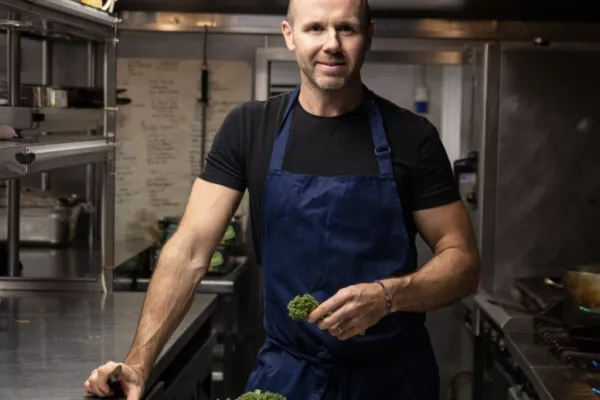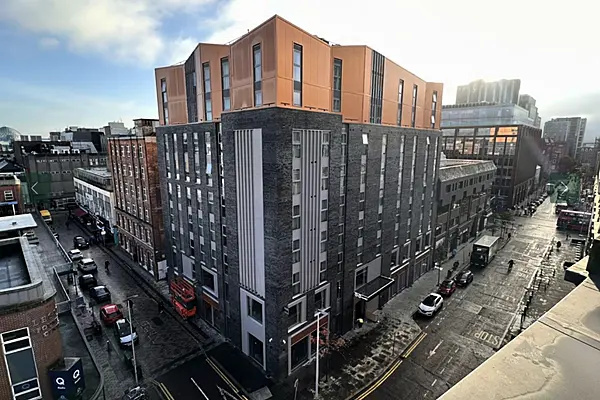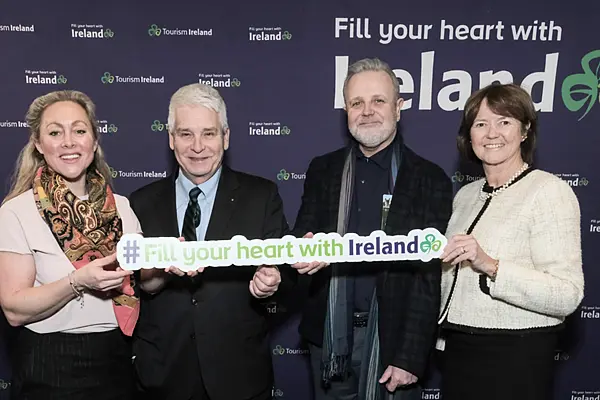Robert McHugh speaks to Oliver Dunne about his new venture ONE Ballsbridge Bar & Restaurant, ‘celebrating conscious gastronomy, culinary creativity and Irish hospitality at its best.’
When he was a teenager who had just dropped out of college, Oliver Dunne had no interest in being a chef.
He could not have known when offered a job by his sister-in-law's brother in the Gotham Cafe on Anne Street it would lead him on a journey that would see him cooking in some of the world’s most renowned restaurants under multi-Michelin acclaimed chefs such as Gary Rhodes, Anthony Demetre, Gordon Ramsay and Shane Osborne.
In 2006, he established his own restaurant group with Aidan Crowe which owns Bon Appetit, PINK Restaurant, Toro Tapas Bar and The Morehampton Donnybrook among others.
In this exclusive interview, Oliver Dunne speaks to Robert McHugh about his new venture ONE Ballsbridge Bar & Restaurant, conscious gastronomy, and what he has planned for the future.
Tell us about ONE Ballsbridge Bar & Restaurant and its ethos.
It's a big space. We will have a ground floor restaurant with a capacity of about 200-220 people and that is divided into four different rooms with a somewhat different design.
On the first floor, we have a big bar which can seat 110 people. It has a pub licence, so on big match days, we can serve a few pints of Guinness or for people going to gigs at the Aviva. We can operate for whatever business is required.
In terms of food, we are what I call a 'hybrid restaurant' which means we are handing over control to the customer. When you go into a traditional restaurant, you sit down and you are presented with a menu and you have a starter, main course and dessert, or else you go to a tapas style restaurant.
We are letting the customer decide how they want to interact with the restaurant. If people want to come in and sit down and have a few pints, knock yourself out, or even a glass wine and a snack, go ahead.
It can nice to have a sharing plate experience where the whole table can share. If people want a traditional meal with three courses, they will be looked after.
We have a big space and so have the ability to be flexible. In a smaller restaurant, you have 60-70 seats, you need to capitalise as much as possible. The revenue each individual brings becomes really important because there are overheads and costs. You have generate a certain amount of revenue from a table of two to make those places work.
This restaurant has a large capacity so we will able to facilitate everyone. I can cater to people spending €50 for a table of two or €20 for a table of two. On the flip side, we can cater to customers who want to spend €1000 for a table of two. We are going to have a big extensive wine list, so if people want high end premium wines, we have it, but we will not be forcing it on anyone.
Why did the group choose Ballsbridge as the location for the latest venue?
We had looked at the area a year before. We were in talks with a prominent restaurant in that area to actually take it over. Those talks fell through in January.
I was looking at that area proactively and during that timeframe, in November-December, the restaurant I was interested in announced its closure. That piqued my interest. I had been in the restaurant already, I was aware of it.
We started pursuing it and looking at it, and it just fit. It is an amazing custom-built property that was only finished 2018 or 2019.
The fit-out cost of the building originally was like €3.5 million and so everything's brand new. We have a brilliant lease and great landlords. When I look at all the things I want for a new unit, it all made sense.
Tell us more about the concept of 'conscious gastronomy.'
As a team and across all the restaurants, I have never been one to jump up and down and shout from the rafters about what we are doing in terms of buying organic.
Our own ethical and moral standpoint is that we have always being doing this in the background, we just never said anything about it before.
We do what is right and when we have the opportunity to buy sustainable we lean that way where it is viably possible to maintain a business.
Most restaurants that claim otherwise are spoofing. If you buy absolutely everything organic, the cost has to be passed on to the customer which has a negative impact on the business. Some customers don't want a plate of organic carrots for €9, they are happy with carrots for €2. It is a trade-off.
For our burgers, we are using Ex Dairy Cow burgers. There are a couple of simple moves you can bring into day-to-day operations which don't have a negative impact on the customer but is better in terms of sustainability.
What first drew you to hospitality?
It was a fluke. I was never interested in being a chef.
I was offered a job by my sister-in-law's brother in the Gotham Cafe in Anne's Street when I was a teenager. I had dropped out of third level education and was just floating around doing nothing. I was offered a job as a commis chef and I took it. Things just went from there.
Do you remember having a first mentor in hospitality?
Yes, a man named Nigel Tighe. Every chef you work under is your mentor to some degree. You take a little something from every single one of them such as their work ethic and their creativity. That drives you as a young chef. You have ten mentors and you take 10% from all of them.
You start off insecure and you don't have a clue what you are doing. You find your own way as you grow up. You realise what you actually like and you don't feel the need to copy anyone and you become yourself.
What are the main challenges in the industry at the moment?
The cost of living crisis and the reduction of footfall. I have seen that across my group which is comforting in one way and scary in another.
It is comforting, because I know we are not a mess in one particular unit and it's pretty much even across the group.
The main challenge is getting people into the restaurant in the first place. I have really noticed in my two touristy based restaurants such as Beef & Lobster on the corner of Dame Street in Dublin and Galway. They were always great for tourist walk-ins but that is really down because hotels prices are expensive not just for international tourists but for people in Ireland deciding to come to Kerry or Cork or Dublin for a weekend.
When hotels, bills and mortgages are really expensive, you don't have the money to go out. A restaurant is the first thing that is seen as an unnecessary expense.
What are the main opportunities?
There are places out there struggling for obvious reasons, such as financial, but that does not mean there are opportunities popping up. My new venture in Ballsbridge is an example of this. There are opportunities for those who wish to take them.
What are your plans for the future that you are allowed to tell us about?
I don't have any fixed plans, we are constantly looking. If I was talking to you next year and we went from ten restaurants to twelve restaurants that wouldn't be a surprise but at the moment there is nothing in the pipeline.
I could hang up today and look at a place tomorrow, and if it fits all requirements of what we need to make it work, we'll have to do it.
What do you like to do when you are not working?
I like to running and going to the gym.
I am not in an actual running club but I go with a big social group of friends and we run in marathons all the time.
My gym is in Malahide and I am in three or four times a week. I have been into fitness my whole life. It keeps the head clear.
It is great putting the runners on and going off for a couple of hours, up the mountains doing trails. You just forget the world.







